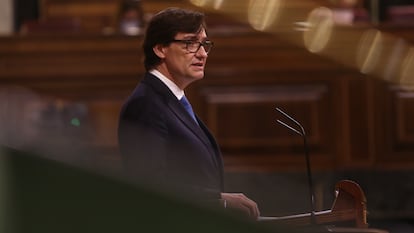Spanish Congress approves six-month extension to state of alarm as coronavirus crisis grows
Main opposition party abstains to show that it considers the emergency measure abusively long

The Spanish government on Thursday secured congressional approval for a six-month extension to the state of alarm declared last Sunday to contain the coronavirus pandemic.
Prime Minister Pedro Sánchez of the Socialist Party (PSOE) managed to secure enough support for his plan despite initial accusations from the opposition that he was overstepping his bounds by trying to secure a long extension while avoiding accountability for his actions in parliament.
Under the conditions of the new state of alarm, regional governments have the power to decide whether and how to limit mobility at their borders. Eleven of Spain’s regions, as well as the exclave cities of Ceuta and Melilla on the northern coast of Africa, already have or will soon be closing their borders ahead of All Saints Day, which falls on a Sunday but has been pushed to Monday in some regions, creating a long weekend that could mean significant travel across the Spanish territory.
The move comes as the coronavirus pandemic continues to spread throughout the country, with new cases up 71% in 15 days, according to the latest Health Ministry report. The 14-day cumulative number of coronavirus cases per 100,000 inhabitants is 453, another record high during this second wave.

The six-month extension obtained 194 votes in favor in the 350-seat lower house of parliament: 155 from his own governing coalition of the Socialist Party (PSOE) and Unidas Podemos, 13 from the Catalan Republican Left (ERC), 10 from Ciudadanos (Citizens), six from the Basque Nationalist Party (PNV), three from Más País and Compromís, four from the Democratic Party of Catalonia (PDeCat) and one each from the regional parties Regional Party of Cantabria (PRC), Galician Nationalist Bloc (BNG) and Teruel Existe. There were 99 abstentions and 53 votes against.
The main opposition group, the Popular Party (PP), abstained to signal that it does not support what it terms “a legal abuse” of power. Its leader, Pablo Casado, had instead proposed a two-month state of alarm with a view to “saving the Christmas season.”
The far-right party Vox, which became the third largest force in the Congress of Deputies following the November 2019 election, has announced that it will challenge the government’s state of alarm before the Constitutional Court.
Health Minister Salvador Illa was tasked with defending the extension in Congress on Thursday – a fact that drew criticism from opposition lawmakers who said Sánchez should have performed that duty. Ciudadanos leader Inés Arrimadas, who supported the state of alarm, still described Sánchez’s absence as “shameful,” while Vox chief Santiago Abascal called the prime minister “a tyrant-in-training.”
The government said the long extension to the state of alarm was based on the fact that it will still be “months” before the efficacy of any vaccine can be demonstrated
In his address, Illa appealed repeatedly to the PP’s “sense of state” to request its support for the six-month extension. The minister underscored that the scenario in Spain is “very worrying” because the country is facing a second wave that is increasing pressure on hospitals.
Illa said that the reason the government wants such a long extension is based on scientific recommendations by the World Health Organization (WHO), and the fact that it will still be “months” before the efficacy of any vaccine can be demonstrated.
At a highly charged debate last week to consider a no-confidence motion against Sánchez filed by Vox, PP leader Casado delivered a passionate speech spelling out his party’s break with the far-right group. But on Thursday, Casado criticized “the government’s deceitfulness” and underscored Sánchez’s absence from the chamber. “You like to govern without judicial oversight,” he told government members in Congress.
Although Sánchez had dismissed calls for regular appearances in Congress to explain the government’s handling of the crisis, the PSOE reached a last-minute deal with the Catalan separatist party ERC: in exchange for support at today’s vote, Sánchez agreed to appear before lawmakers every two months. Other parties had been demanding monthly oversight.
By securing a six-month extension, Sánchez is avoiding a repetition of the situation that emerged in March, when the first state of alarm was declared in Spain and Sánchez was forced to seek renewals every 15 days at increasingly acrimonious congressional debates.
English version by Susana Urra.
Tu suscripción se está usando en otro dispositivo
¿Quieres añadir otro usuario a tu suscripción?
Si continúas leyendo en este dispositivo, no se podrá leer en el otro.
FlechaTu suscripción se está usando en otro dispositivo y solo puedes acceder a EL PAÍS desde un dispositivo a la vez.
Si quieres compartir tu cuenta, cambia tu suscripción a la modalidad Premium, así podrás añadir otro usuario. Cada uno accederá con su propia cuenta de email, lo que os permitirá personalizar vuestra experiencia en EL PAÍS.
¿Tienes una suscripción de empresa? Accede aquí para contratar más cuentas.
En el caso de no saber quién está usando tu cuenta, te recomendamos cambiar tu contraseña aquí.
Si decides continuar compartiendo tu cuenta, este mensaje se mostrará en tu dispositivo y en el de la otra persona que está usando tu cuenta de forma indefinida, afectando a tu experiencia de lectura. Puedes consultar aquí los términos y condiciones de la suscripción digital.








































